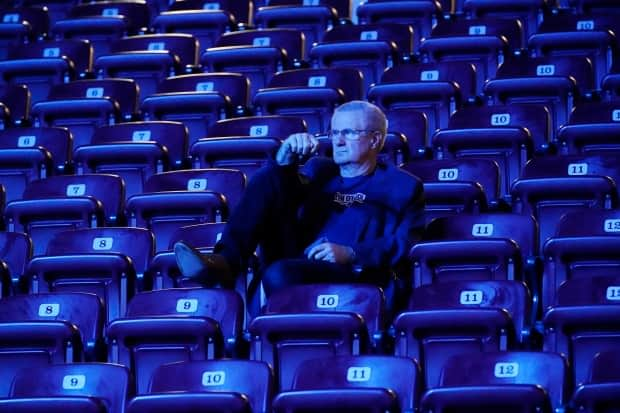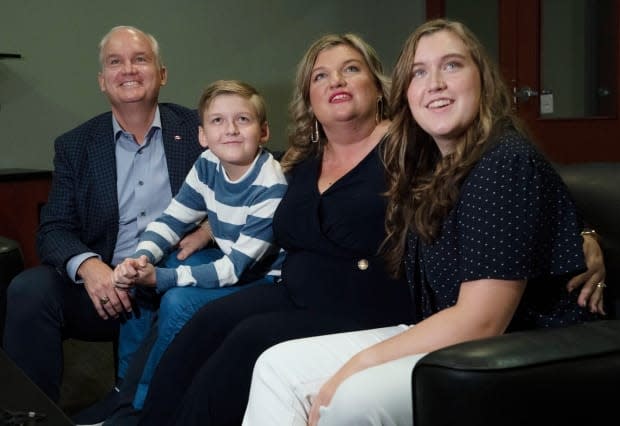Conservative Leader Erin O'Toole sticks with moderate message despite falling short

Conservative Leader Erin O'Toole started this campaign by introducing himself to the country as a more moderate Tory. So far, the results suggest Canadians didn't buy into the message in a big way.
Nevertheless, O'Toole stood by his approach during his concession speech and warned disappointed party members that another snap election could be coming soon.
"In the months ahead, as Mr. Trudeau gears up for yet another election, we must continue this journey to welcome more Canadians to take another look at our party," he said in the early hours of Tuesday morning.
"We will take stock of what worked and what didn't and we will continue to put in the time showing more Canadians that they are welcome in the Conservative Party of Canada."

His warning about a snap election likely was meant as a signal to the Conservative caucus to keep questions about his leadership at bay.
"If [Trudeau] thinks he can threaten Canadians with another election in 18 months, the Conservative Party will be ready," he said.
"And whenever that day comes, I will be ready to lead Canada's Conservatives to victory."
WATCH | O'Toole warns of another election under Trudeau:
Liberal Leader Justin Trudeau has won enough seats in this 44th general election to form another minority government. While Conservatives snagged a larger share of the share of the vote, as of 11:50 a.m. ET Tuesday they were leading or elected in 119 ridings — two fewer than the party held under former Conservative leader Andrew Scheer following the last election — and 39 fewer than the Liberal totals.
"It's a disappointing night for Conservatives," said former Conservative cabinet minister Lisa Raitt during the CBC election night coverage.
WATCH | 'I will be ready': O'Toole promises victory next time:
Promised an inclusive, diverse, forward-looking party
Throughout the campaign, O'Toole pitched himself as a new breed of Conservative by distancing himself from the policies of past leaders like Stephen Harper and Scheer. Harper and Scheer were more closely tied to the Conservative Party's more right-leaning predecessor parties — Reform and Canadian Alliance.
"It is a conservatism that reveres strong communities and compassion for one another for our environment and those in need at home and abroad," he said during his speech.
"It is a conservatism that respects hard work and character and the fact that millions have come to this great country for liberty and opportunity. It's a conservatism that believes reconciliation is more than a box to check, it is the very keystone of Canada reaching its potential and it starts as clean drinking water as a basic human right still denied to Indigenous children born today. And above all else, it is a conservatism that believes Canada is the greatest country on Earth and that our best days are on the horizon."

During the election campaign, he repeated his promise that a Conservative government led by him would make sure abortion services are available nationwide and made direct appeals to the LGBT community.
"I think what Erin attempted to do at the beginning was to have Canadians get to know him," said Raitt.
"When he won the leadership, he came out very clearly and he said I am pro-choice, I am an ally of LGBTQ+ community and I'm going to have a plan. And that's exactly what he did starting day one."
Failed to make inroads in key battles
But O'Toole may have invited scepticism about his allegiances on the divisive issue of firearm regulations.
In early September, he reversed course on a platform promise to overturn a ban on some 1,500 makes and models of what the Liberal government described as "military-grade weapons."
The Liberal government first introduced the ban with an Order in Council in May 2020, which the Conservative platform promised to repeal. O'Toole said that the ban would remain in place under a Conservative government while a public review of the firearm classification system is conducted.

O'Toole fought to change how Canadians concerned about the climate crisis perceive the party — a perception driven in part by the delegates at the party's policy convention who voted to reject adding green-friendly statements to the policy book earlier this year.
One of the first major policy announcements O'Toole introduced was a new climate plan, which was criticized for returning to the lower emissions targets first set by Stephen Harper.
With hundreds of thousands of mail-in ballots still to be counted, some races are too close to call.
But my mid-morning, it appears his message didn't resonate in Ontario where the Conservatives both lost MPs and failed to flip needed seats to stop a Liberal government.
Their commanding grip on Alberta also somewhat loosened, with the NDP's Blake Desjarlai defeating two-term Conservative MP Kerry Diotte in Edmonton Griesbach and Liberal George Chahal claiming victory over incumbent Conservative Jag Sahota in Calgary Skyview.
And in battleground British Columbia they failed to make inroads in Metro Vancouver.
Leadership questions
There were some wins for those under the blue banner election night. The Conservatives gained seats in Atlantic Canada and unseated cabinet ministers — one in Nova Scotia and two in Ontario — showing some voters are ready for change.
Preliminary results show prominent and outspoken Conservatives like Pierre Poilievre and Michelle Rempel Garner were also rewarded and will return to the House of Commons. Scheer is also projected to win his seat again.
The Conservative caucus will be welcoming O'Toole's leadership rival Leslyn Lewis, who spoke directly to the social conservative members in the party and is projected to win in Ontario.
Given the results, questions about O'Toole's future can be expected to dominate his news conferences in the coming hours and days.
"That's going to be a difficult conversation he's going to be having with members of his caucus," said Raitt.
"Little too early tonight to say it's all bad for him."
PPC effect?
The coming days will also see analysts looking into whether the People's Party of Canada managed to siphon enough votes away from Conservative candidates to keep them from joining Parliament.
In the final days of the campaign, O'Toole tried to appeal to those PPC supporters, arguing conservative-minded voters sick of the Liberal government should park their votes with the Tories rather than turn to the smaller party.
"There are actually millions of Canadians who are very frustrated with Mr. Trudeau. If they allow that frustration to do anything other than vote Conservative, they're voting for Mr. Trudeau," O'Toole said.
The PPC sits at about five per cent of the popular vote at last count. While that hasn't translated into seats, and leader Maxime Bernier lost his own race, the party has done notably well in Ontario.
WATCH | PPC Leader Bernier speaks to supporters on election night:
